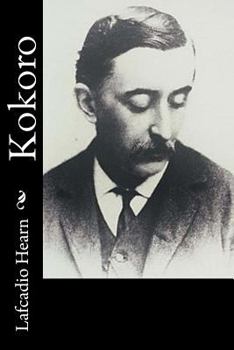Kokoro
Select Format
Select Condition 
Book Overview
"The papers composing this volume treat of the inner rather than of the outer life of Japan, for which reason they have been grouped under the title Kokoro (heart). [This] word signifies also mind, in... This description may be from another edition of this product.
Format:Paperback
Language:English
ISBN:1540530590
ISBN13:9781540530592
Release Date:November 2016
Publisher:Createspace Independent Publishing Platform
Length:212 Pages
Weight:0.64 lbs.
Dimensions:0.5" x 6.0" x 9.0"
Customer Reviews
3 ratings
The Heart of Things
Published by Thriftbooks.com User , 15 years ago
"Kokoro" is a difficult word to translate from Japanese to English. Heart, Spirit, Way of Being...it is all of these things. Rather than attempt a direct translation, Lafcadio Hearn offers a selection of stories focusing on Japanese inner life, so that by the end you will understand kokoro. The stories follow Hearn's particular interests of Japanese folklore and the vanishing culture of which he found himself a part in post-Meji Japan. Each story is a slice of life focusing on Japanese character, morals and feelings. This is what the Japanese people care about, what they think is important, what is inside. The selected tales are non-judgmental and non-orientalist. This is no attempt to explain or highlight the "strange" Japanese, but merely a record and an illumination, in the best sense of the term. The collected stories: "At a Railway Station" "The Genius of Japanese Civilization" "A Street Singer" "From a Traveling Diary" "The Nun of the Temple of Amida" "After the War" "Haru" "A Glimpse of Tendencies" "By Force of Karma" "A Conservative" "In the Twilight of the Gods" "The Idea of Pre-Exsistance" "In Cholera Time" "Some Thoughts about Ancestor Worship" "Kimiko"
A Fluent Translation of Unspoken Worldviews
Published by Thriftbooks.com User , 16 years ago
Not to be confused with Natsume Soseki's novel by the same title, Lafcadio Hearn's "Kokoro" is a magnificent collection of essays, vignettes, memoirs, and meditations on Japan in the 1890's. Very much a product of the mid-Meiji period, these masterfully-written little literary pieces are nonetheless timeless. Each piece is quite different from the rest, and yet almost all of them manage to start from everyday incidents or obvious observations and gradually spiral inwards to some deeply moving and startling insight into Japanese attitudes, values, and worldviews; more than once this seemingly methodless method allows Hearn to share with the reader certain common opinions and normal spiritual orientations held by average Japanese folks--the kinds of things usually taken for granted and so unarticulated, hence least amenable to documentation and scholarship (especially of the time, but even today). And Hearn does all this with an unpretentious erudition and an understated and balanced sympathy for his subject that, along with his literary flair for wonderfully clear and flowing prose, places his writings here in a category far above the rest. With him we can find none of the unintentional strains of condescension and orientalism so typical of folklore and religious anthropology, for while he's looking with the surprised gaze of the outsider with one eye, his other eye is that of the insider feeling very much at home where he is. The resulting view is visionary--but in subdued and shadowy tones. Appendix on an Appendix: in addition to the fifteen excellent essays forming the main body of "Kokoro", there's an extensive appendix featuring Hearn's translations of three popular folk ballads: "The Ballad of Shuntoku-Maru", "The Ballad of Oguri Hangwan" and "The Ballad of O-Shichi, the Daughter of the Yaoya". These are fascinating on a number of levels. They provide a tantalizingly fleeting glimpse of plebian drama, remarkable in its very lack of remarkableness. There's a certain sociological angle, as the versions of these oral ballads collected and translated by Hearn are those recited by mountain outcastes in the area of today's Shimane Prefecture. Religiously the first two ballads are key in understanding popular attitudes concerning pilgrimage in Japan--the first demonstrating a creepy (almost voodoo) edge in Kannon faith at Kiyomizudera Temple, the second delightfully exaggerating the rejuvenating benefits of Kumano and its sacred hot springs. Meanwhile, the third ballad is a straightforwardly melodramatic retelling of a true story better known to us today in a more refined and literary version as found in the novelist Saikaku's "Five Women Who Loved Love" of 1686.
The Heart of Things
Published by Thriftbooks.com User , 20 years ago
"Kokoro" is a difficult word to translate from Japanese to English. Heart, Spirit, Way of Being...it is all of these things. Rather than attempt a direct translation, Lafcadio Hearn offers a selection of stories focusing on Japanese inner life, so that by the end you will understand kokoro.The stories follow Hearn's particular interests of Japanese folklore and the vanishing culture of which he found himself a part in post-Meji Japan. Each story is a slice of life focusing on Japanese character, morals and feelings. This is what the Japanese people care about, what they think is important, what is inside.The selected tales are non-judgmental and non-orientalist. This is no attempt to explain or highlight the "strange" Japanese, but merely a record and an illumination, in the best sense of the term.The collected stories:"At a Railway Station""The Genius of Japanese Civilization""A Street Singer""From a Traveling Diary""The Nun of the Temple of Amida""After the War""Haru""A Glimpse of Tendencies""By Force of Karma""A Conservative""In the Twilight of the Gods""The Idea of Pre-Exsistance""In Cholera Time""Some Thoughts about Ancestor Worship""Kimiko"




